The Deepfake Crisis That Didn’t Happen
3 min read
This is Atlantic Intelligence, a limited-run series in which our writers help you wrap your mind around artificial intelligence and a new machine age. Sign up here.
Presidential elections in the United States are prolonged, chaotic, and torturous. (Please, not another election needle …) But they don’t come close to rivaling what happens in India. The country’s latest national election—which wrapped up this week with the reelection of Prime Minister Narendra Modi—was a logistical nightmare, as it always is. To set up polling booths in even the most rural of areas, Indian election officials hiked mountains, crossed rivers, and huddled into helicopters (or sometimes all three). More than 600 million voters cast ballots over the course of six weeks.
To add to the chaos, this year voters were deluged with synthetic media. As Nilesh Christopher reported this week, “The country has endured voice clones, convincing fake videos of dead politicians endorsing candidates, automated phone calls addressing voters by name, and AI-generated songs and memes lionizing candidates and ridiculing opponents.” But while experts in India had fretted about an AI misinformation crisis made possible by cheap, easy-to-use AI tools, that didn’t exactly materialize. Lots of deepfakes were easily debunked, if they were convincing at all. “You might need only one truly believable deepfake to stir up violence or defame a political rival,” Christopher notes, “but ostensibly, none of the ones in India has seemed to have had that effect.”
Instead, generative AI has become just another tool for politicians to get out their messages, largely through personalized robocalls and social-media memes. In other words, politicians deepfaked themselves. The point isn’t necessarily to deceive: Modi retweeted an obviously AI-generated clip of himself dancing to a Bollywood song. It’s an eye-opening lesson for the U.S. and other countries barreling toward elections of their own. For all the concern about reality-warping deepfakes, Christopher writes, “India foreshadows a different, stranger future.”
— Saahil Desai, supervisory senior associate editor

The Near Future of Deepfakes Just Got Way Clearer
By Nilesh Christopher
Throughout this election cycle—which ended yesterday in a victory for Modi’s Bharatiya Janata Party after six weeks of voting and more than 640 million ballots cast—Indians have been bombarded with synthetic media. The country has endured voice clones, convincing fake videos of dead politicians endorsing candidates, automated phone calls addressing voters by name, and AI-generated songs and memes lionizing candidates and ridiculing opponents. But for all the concern over how generative AI and deepfakes are a looming “atomic bomb” that will warp reality and alter voter preferences, India foreshadows a different, stranger future.
Read the full article.
What to Read Next
- ElevenLabs is building an army of voice clones. Last month, my colleague Charlie Warzel profiled an AI-audio company that has been implicated in deepfakes. “I tested the tool to see how convincingly it could replicate my voice saying outrageous things,” he writes. “Soon, I had high-quality audio of my voice clone urging people not to vote, blaming ‘the globalists’ for COVID, and confessing to all kinds of journalistic malpractice. It was enough to make me check with my bank to make sure any potential voice-authentication features were disabled.”
P.S.
If you need another sign of how targeted ads are coming for everything, behold: “Costco is building out an ad business using its shoppers’ data.” The wholesale giant will soon personalize ads based on its customers’ shopping habits—joining Venmo, Uber, Marriott, and a slew of other companies. “What isn’t an ad these days?” Kate Lindsay wrote in The Atlantic earlier this year.
— Saahil



